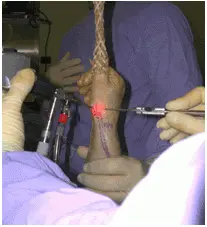手首と手の関節鏡検査
What it is:
arthroscopy is a minimally invasive procedures that allows to visualize the inside of a joint. Arthroscopy allows to diagnose and treat many problems through a series of very small incisions (portals) that not need to be sutured. The incisions used are smaller and disrupt less soft tissues than open surgery, so that pain, swelling and stiffness are minimized and recovery is faster. Wrist arthroscopy allows the visualization of the cartilage surfaces, removal of foreign bodies, better evaluation of the ligaments. Often arthroscopy is used to aid in the reduction of fractures of the bones of the wrist. Arthroscopy is also used to assess the integrity of the TFCC (triangular fibrocartilage). Wrist arthroscopy can be used to remove ganglions of the wrist and to assess the extent and treatment of various types of arthritis of the wrist.
A small camera fixed to the end of a fiber-optic scope (1.9mm wide) is inserted through a small incision in the skin (about 5mm long) directly into the joint. Through another smaller incision other tools are inserted to proceed with the treatment needed. The joint is usually put in traction as to expand the articular space. Sometimes wrist arthroscopy is combined with open procedures.
According to the procedure used a dressing or a splint may be applied at the end of the procedure.


